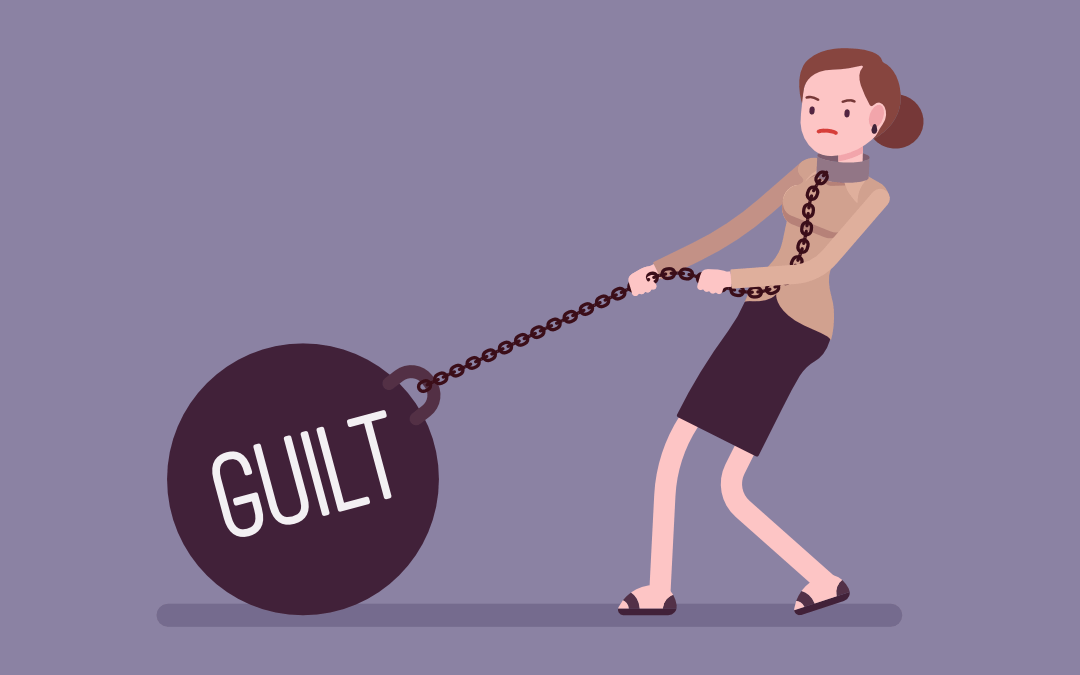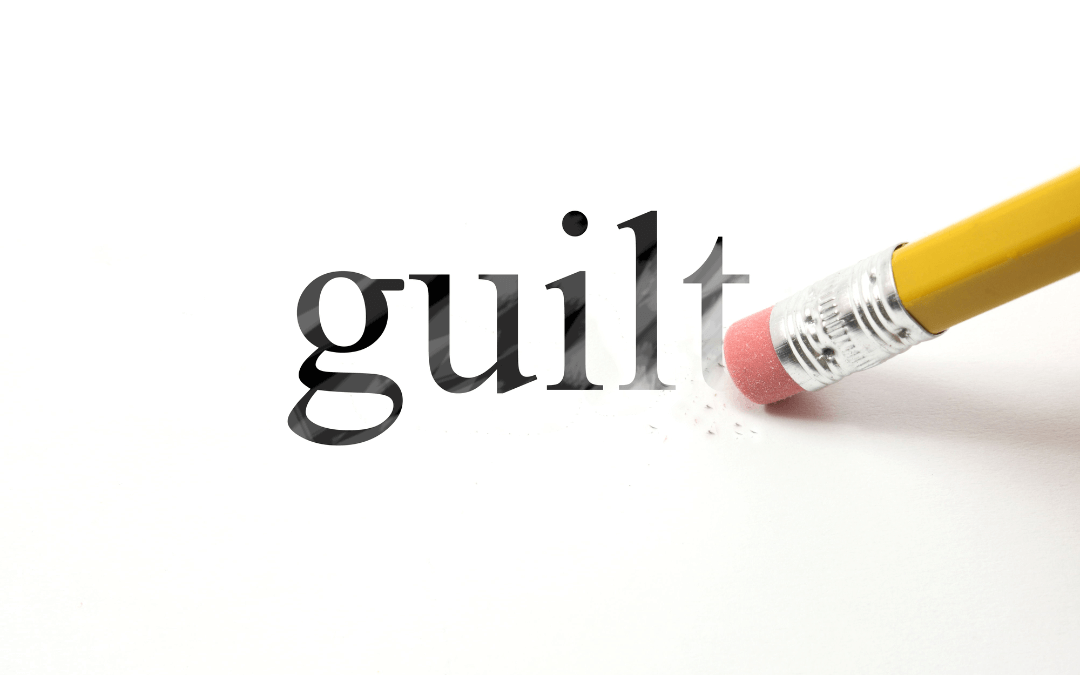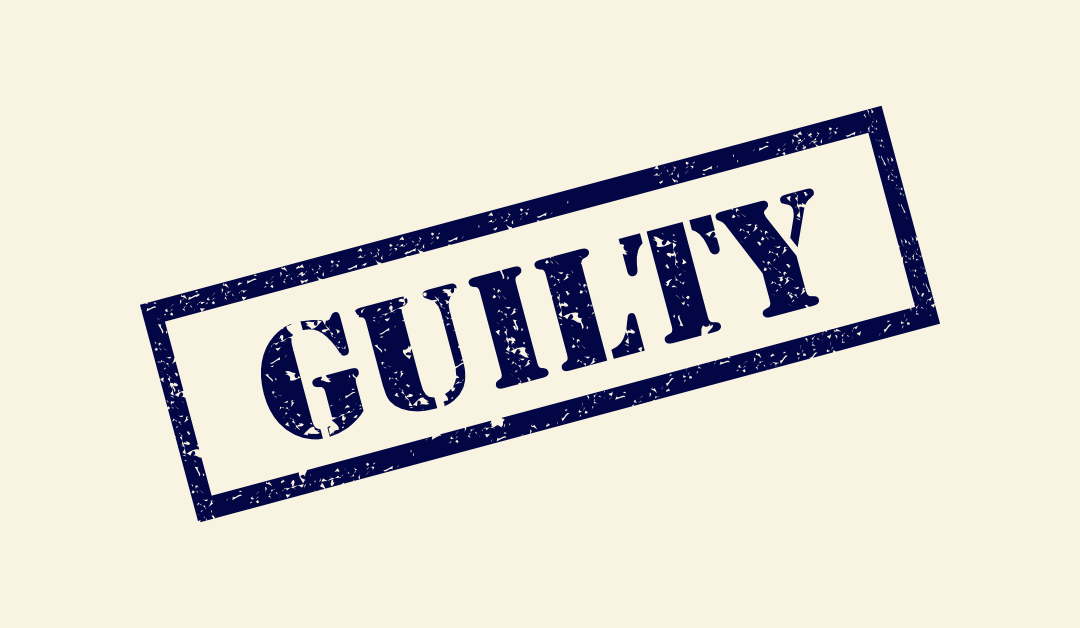Guilt is a feeling, meaning we are taught to experience it. Worse, we are trained into keeping ourselves feeling guilty as a form of self-punishment. This dynamic is based on the limiting belief in some societies that we were born to suffer and that mistakes deserve to be punished.
Over the years, feeling guilty becomes chronic because every feeling we practise long enough turns into a habit eventually. But every habit can be changed. If you are ready to leave guilt behind forever, read on.
Guilt is not universal
Emotions are chemical chain reactions in our bodies. We are born with them and through living life we go through events that trigger them. Feelings are the conscious processing of outside events and reactions in our bodies.
We are taught how to feel about subjects, like money, by our parents and caregivers early on in our lives. We are also taught how to behave and do the “right” thing. What “right” means, entirely depends on the society we grow up in.
Guilt is not universal. In the 1980s the Buddhist monk Ajahn Chah from the Theravada tradition in Thailand went for a visit to England. In an interview he was asked how we should deal with guilt. The translator had to explain to him what guilt was and what people did to themselves when they felt guilty because the monk did not know the feeling.

Guilt or remorse?
The Buddhist monk was familiar with remorse. When we think back to past decisions and actions, we sometimes feel remorse, especially if they had negative results. So we apologise and then we can leave it at that.
Guilt is different. In many societies one core limiting belief is that we must suffer for our sins, mistakes or even just for existing. This belief comes from medieval Christianity when suffering was promoted as a way to make amends and purify the soul.
While hardly anyone still practices self-flaggelation, most of us do the next worst thing: We make ourselves feel guilty. How? By repeatedly thinking thoughts that trigger an emotions cocktail of shame, fear and sadness. Instead of understanding that we all make mistakes, apologise and move on, we torture ourselves with guilt.
Why do we feel guilty?
We may not whip our bodies anymore, but we still beat ourselves up. We even still call the action that. Why would we do that? Why would we keep ourselves feeling guilty when there is in fact no reason whatsoever?
We are social creatures born with the need to fit in and be accepted by the people in our environment. Over time, we watch them beat themselves up over mistakes. When we do not feel guilty enough, or feel bad long enough after we do something “wrong”, people often get angry.
And those rare individuals who refuse to feel guilty? We watch them be criticised or even remorselessly excluded from the group. For social creatures this result is scary. Now that we are adults though, I hope you agree, that you deserve to feel good about yourself and your life.
You deserve to leave guilt behind and change one of the worst habits we have. Guilt serves no purpose, keeps you stuck in negative thought patterns and unhelpful emotions. It’s time to let go.

Two new behaviours
Changing thoughts can be quite difficult for some people (including me). Choosing new actions, on the other hand, is often easier. Luckily, with guilt we can focus on two key actions we take several times a day as the way out.
I learned about these two new habits in the book Transurfing by Vadim Zeland and they are incredibly effective because they work on the root causes for guilt, which are the limiting beliefs that mistakes are terrible and we need to suffer for making them.
What we do is change the actions that constantly undermine our sense of self-worth. Over time, we regain our knowledge that we are inherently worthy of a happy and healthy life. By practising these techniques in general every day, not just when we feel guilty, we avoid having that feeling in the first place. So here is what to do:
1. Don’t apologise
Stop saying you are sorry. If you make a genuine mistake that has negative consequences, apologise once. Then move on. But avoid the general apologies you say every day a thousand times, even for things that have nothing to do with you.
Depending on the country you live in, this might be quite difficult. You might also be perceived as rude. But that’s just people trying to make you feel guilty because they were taught to feel guilty. By staying the course and only apologising when there is an actual reason, you stop feeling guilty yourself and inspire others to feel better too.
Think about it. Do you or anyone else really deserve to torture themselves for a mistake? Do you really believe that we all need to suffer for days or even weeks about what is in almost all cases a minor blooper?

2. Don’t justify your decisions and actions
Once you decide to keep an eye out for it, you’ll notice pretty quickly how often you say sorry for no reason. But justifying our decisions and actions is so ingrained, that it might take a bit to even notice that you are doing it. Because you are doing it. We all are, all the time.
“Why did you decide to move to Portugal? And why Portugal?” “Why do you not want that new job?” These questions seem like idle curiosity and we are used to asking and answering them. But what they really do is train us and others into justifying our decisions and actions. If you have ever answered a question like that with “because I wanted/didn’t want to”, you’ll know that most people will not leave it at that.
Luckily, these conversations are comparatively rare and you can often get away easily. (By that I mean walk away asap.) The real issue is that we justify ourselves without being asked. Watch out how often you explain your decisions and actions to others after the fact even though no one asked. So stop that.
Once you do, you train yourself into remembering that you have the right to do what you want. You do not owe anyone an explanation, much less a justification. If people, like your boss, are in a position to demand the reasoning behind your actions, share by all means. But only if you are asked. No more automatic justifications.
Self-worth
The idea that we need to suffer for mistakes undermines our self-worth. The two actions you can practise every day builds it up again. Once you stop apologising for things that are not even your fault, you release constant background guilt.
When you allow yourself to take actions and make decisions without feeling the need to convince others of the validity, you practise taking yourself seriously, allow yourself to be you and to take up space in this world.
After the translator explained to Ajahn Chah (the Buddhist monk) what people did to themselves with guilt, he answered, that this was very bad and asked his translator to tell people not to do that. He knew that guilt is a form of torture. It’s a modern version of self-flaggelation.
Instead of crippling our bodies, like people did in the middle ages, we cripple our minds and keep ourselves from being who we were born to be. Time to put this habit back in it’s place and to leave guilt in the past so we can feel how we were born to feel: Inherently worthy.
